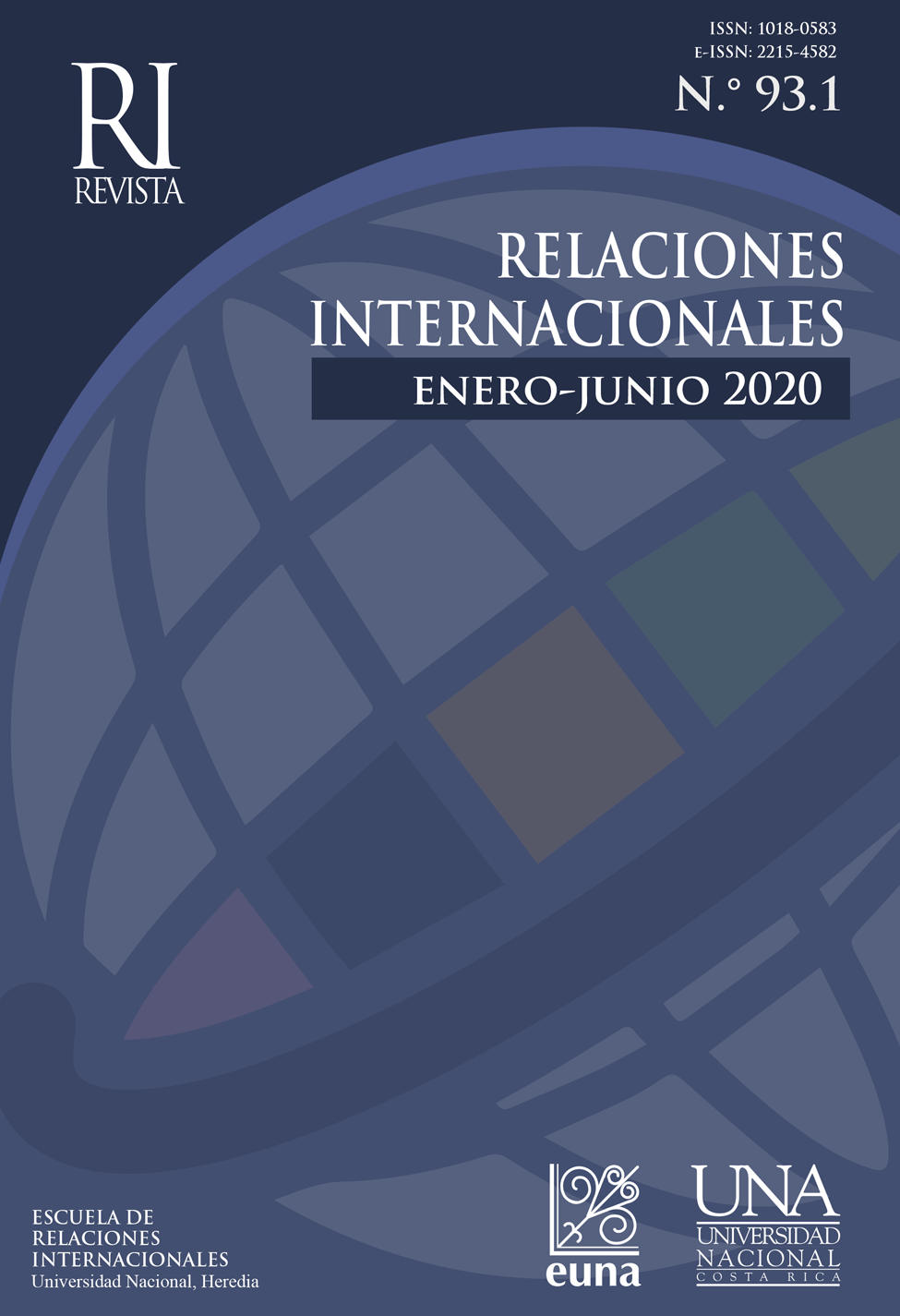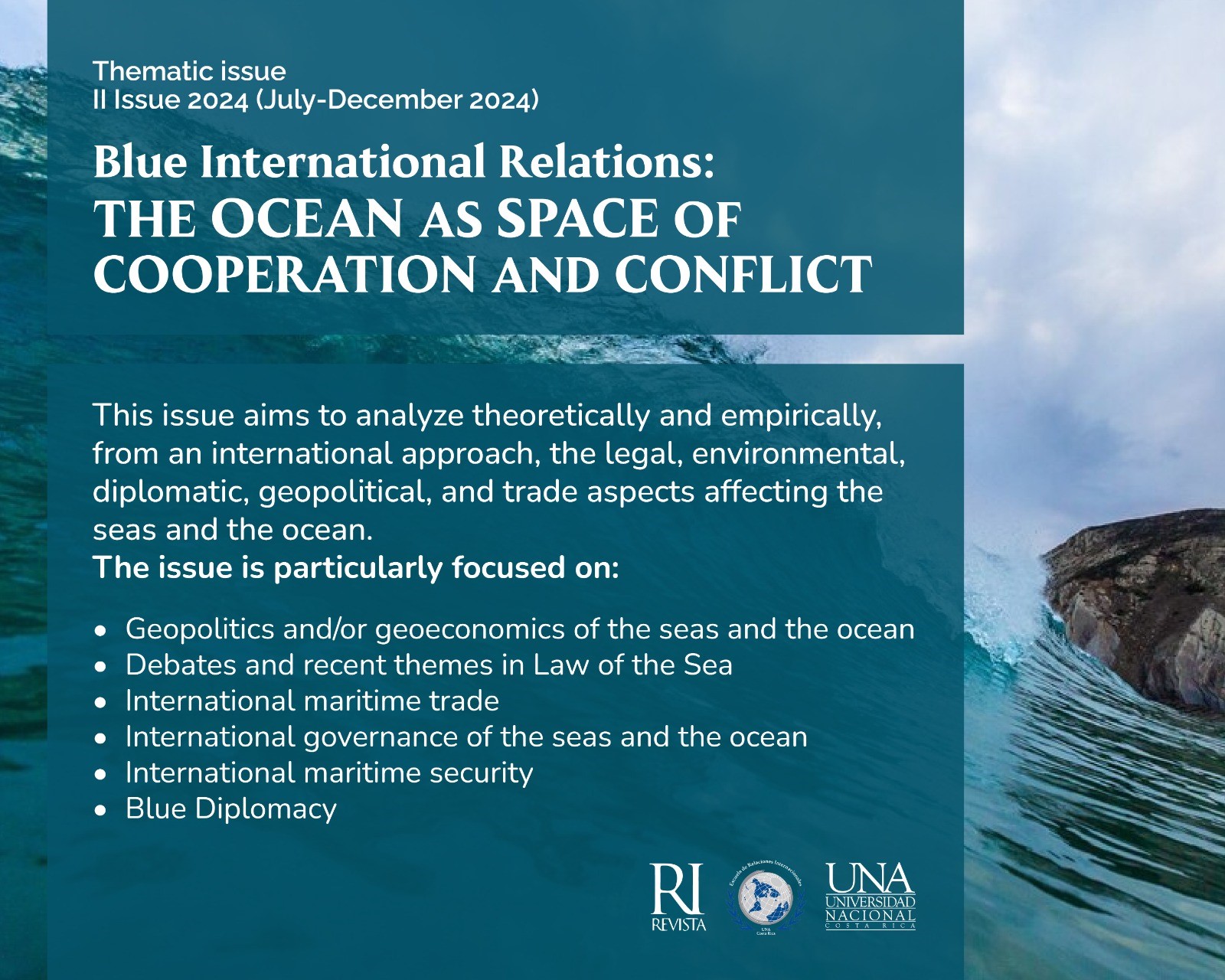South Korea's Foreign Policy for the Reconstruction of a Collective Identity with North Korea
DOI:
https://doi.org/10.15359/ri.93-1.3Keywords:
Identity, social interaction, foreign policy, social factors, South KoreaAbstract
During Park Geun hye and Moon Jae presidential terms, there was implemented a foreign policy that emphasized the construction of a collective identity for the pacification of the peninsula. The article seeks to answer how the South Korean leaders used identity elements, either similar or different, in the context of their foreign policies for the pacification of the peninsula. A qualitative research methodology was used through interviews, analysis of documents and official websites, these being interpreted by the content analysis method. It is stated that South Korea's foreign policy towards North Korea, during these administrations, was based on an ideational structure that rescued the construction of a Korean collective identity, being these identity elements (shared by South Korean leaders) the factors that favored social interaction for the promotion of pacification.
References
Connor, M. E. (2009). The Koreas. ABC, CLIO LLC.
Feng, L. y Ruizhuang, Z. (2006). The Typologies of Realism. The Chinese Journal of International Politics, 1(1): 109–134. https://doi.org/10.1093/cjip/pol006
Jincheol, C. (23 de mayo, 2019). Entrevista . (A. Maldonado, entrevistador).
Korea. Net. (2018). La paz un nuevo comienzo, cumbre intercoreana. http://spanish.korea.net/FILE/pdfdata/2018/04/2018_inter-korean_summit_ES.pdf
Lamont, C. (2015). Research Methods in International Relations. Sage Publications Ltd.
Levin, N., y Han, Y. (2002). Sunshine in Korea: The South Korean Debate over Policies Toward North Korea. RAND. https://www.rand.org/content/dam/rand/pubs/monograph_reports/2005/RAND_MR1555.pdf
Llenderrozas, E. (2013). Relaciones Internacionales Teorías y Debates. EUDEBA
Middlenton, L. (1997). South Korean Foreing Policy. En Kim, D. y Kong, T. (eds)., The Korean Peninsula in Transition (pp. 149-194). Macmillian Press LTD.
Ministry of Foreign Affairs Republic of Korea. (2018). Panmunjom Declaration for Peace, Prosperity and Unification of the Korean Peninsula. http://www.mofa.go.kr/viewer/skin/doc.html?fn=2018091804122336&rs=/viewer/result/202005
Ministry of Unification. (2019). White paper on Korean Unification 2019. https://www.unikorea.go.kr/eng_unikorea/news/Publications/whitepaper/
Ministry of Unification. (2006). A Brief Review of Inter-Korean Relations. https://www.unikorea.go.kr/eng_unikorea/news/releases/%3Bjsessionid=yD7CKuCV9d929-4ZceWSd25p.unikorea11?boardId=bbs_0000000000000034&mode=view&cntId=31496&category=&pageIdx=28
Ministry of Unification. (2017). Moon Jae in´s Policy on the Korean Peninsula. https://www.unikorea.go.kr/eng_unikorea/policylssues/koreanpeninsula/goals/
Ministry Unification. (2013). Seeking trust to enhance inter-korean relations and unite the Korean peninsula. https://www.ncnk.org/sites/default/files/content/resources/publications/trust_buidling_process.pdf
Morgenthau, H. (1985). Política entre las naciones. La lucha por el poder y la paz. Grupo Editor Latinoamericano.
Ministry of Unification. (2005). Promoting the policy of peace and prosperity. En White Paper on Korean Unification 2005 (cap. 1). https://www.unikorea.go.kr/eng_unikorea/news/Publications/whitepaper/
Sang-Jin, H. (2018). Asian Tradition and Cosmopolitan Politics Dialogue with Kim Dae-Jung. Lexington Books.
Schiavon, J., Ortega, A., Vallejo, M., y Velázquez, R. (2014). Teoría de las Relaciones Internacionales en el siglo XXI. Interpretaciones críticas desde México. Universidad Autónoma de Baja California.
Schreier, M. (2012). Qualitative Content Analysis in Practice. Sage Publications Inc.
Sik, S. (2010). Historia coreana. Asociación para el desarrollo de la educación de los coreanos en el exterior.
Smith, S., Hadfield, A., y Dunne, T. (2012). Foreign Policy, Theories, Actors, Cases. Ashford Colour Press Ltd.
Sungjoo, H. (1980). South Korea and the United States: The Alliance Survives. Asian Survey, 20(11), 1075-1086. doi:10.2307/2643910
The Korean Culture and Information Service. (2000). Junio de 2000: la primera cumbre intercoreana a través del muro de la división. http://spanish.korea.net/Government/Current-Affairs/National-Affairs/view?subId=646&affairId=659&articleId=34489#
The National Committee of North Korea. (2007). Declaration on the Advancement of South-North Korean Relations, Peace and Prosperity. https://www.ncnk.org/sites/default/files/2007_North-South_%20Declaration.pdf
The National Committee on North Korea. (2018). Pyongyang Joint Declaration of September 2018. https://www.ncnk.org/node/1633
The Republic of Korea. (2017). Moon Jae-in President of the Republic of Korea. http://www.korea.net/FILE/pdfdata/2017/11/MoonJae-inPresidentoftheRepublicofKorea_en_1113.pdf
United Nations. (1972). The July 4 South-North joint Communique. https://peacemaker.un.org/korea-4july-communique72
Wendt, A. (1992). Anarchy is what States Make of it: The Social Construction of Power Politics. International Organization, 46(2), 391-425. www.jstor.org/stable/2706858
Wohlforth, W. (2012). Realism and Foreign Policy. En Smith, S., Hadfield, A., y Dunne, T. (eds)., Foreign Policy: Theories, Actors, Cases.: Oxford University Press.
Zehfuss, M. (2002). Constructivism in International Relations. Cambridge University Press.
Published
How to Cite
Issue
Section
License

Revista de Relaciones Internacionales por Universidad Nacional de Costa Rica está bajo una Licencia Creative Commons Atribución-NoComercial-SinDerivar 4.0 Internacional








1.png)







3.png)
